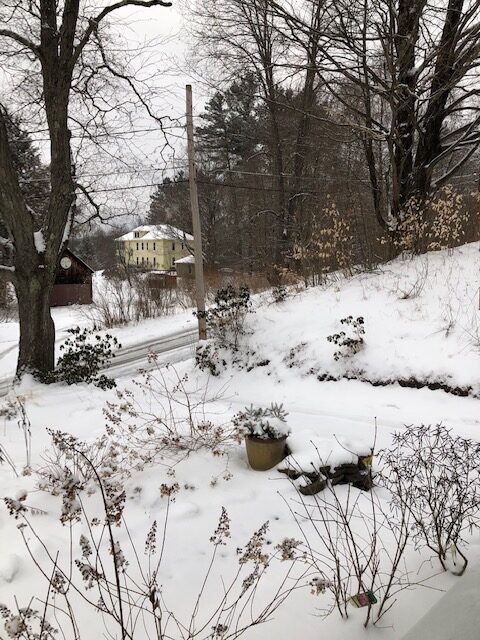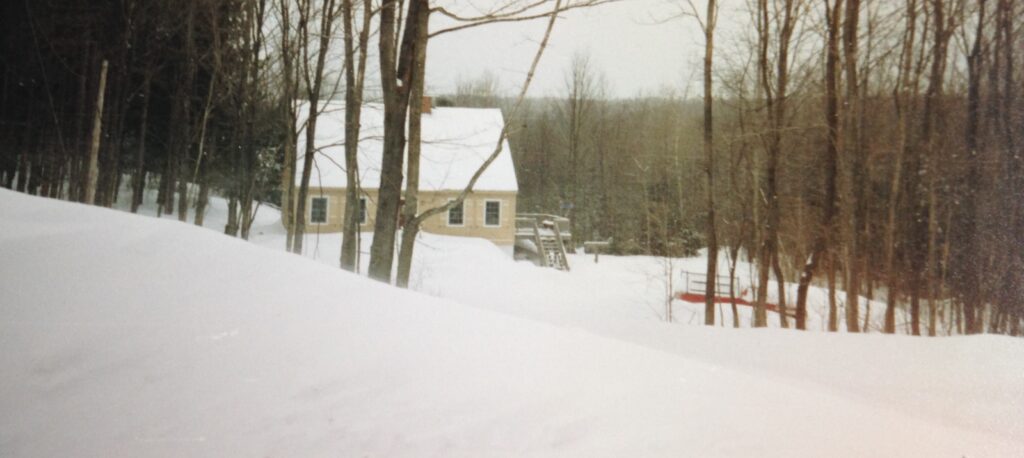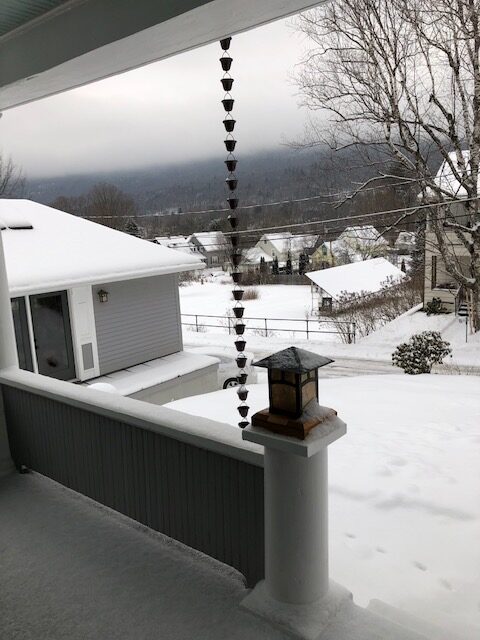Suddenly, we have winter again. That’s what it seems like. It began Wednesday night, and the next day we were shoveling snow made heavy by rain and freezing rain. Friday, I had to sand the driveway because of what happened overnight. Light snow was a constant yesterday. We’ll be shoveling for sure today when it’s a bit warmer. It’s 17 degrees F now. The cat, who likes to go outside, sits on the back of the couch, staring at the snow. Actually, this has not been a hard season, and naturally, I think of the ones before it that were.
I survived tough winters when we lived in the boonies of Western Massachusetts. Snow storms. Ice storms — the absolute worst. Storms that lasted days. Lingering cold. One month it didn’t get above the 20s so road salt didn’t work.
When I was a reporter and worked from home, covering winter weather in the hilltowns of Western Mass. was part of my beat. I would check in with road bosses about conditions, and interview residents, store owners, and in those days, a loyal weather watcher who was the custodian in our kids’ school. People loved to talk about the weather.
Then, I became an editor, which required me to commute from our home in Worthington to the newsroom in the nearest city, Northampton. My route was through three small towns, up and down steep hills. Each time I reached a border I hoped the highway crew had been there before me, and it was extremely rare they hadn’t. I knew their schedules. I left at 6:10 a.m. for work because a plow truck would make a sweep of the steep hill outside our home at 6 a.m. The crews in the towns I traveled were out early, too.
We had to have our steep driveway plowed, and sometimes I just parked at the top, knowing we weren’t among the first on her list. (Yes, the person who did that was a woman.)
By the way, our middle son plowed state roads during the winter for a contractor. He has his own stories to tell.
If a bad storm came while I was at work, I left at 1 p.m. It wasn’t worth going at noon, because the guys always broke then for lunch no matter the weather. If necessary, I found places to stay overnight — with one of the kids, when they went to school, or with a co-worker.
I stored three buckets of sand in the back of my Subaru for ballast.
I watched the weather constantly.
I waited for spring.
Then, we moved to Taos, New Mexico. We were at the same latitude as South Carolina but at 7,200 feet elevation or higher. Temps had 30-degree differentials between night and day. We got snow, dry stuff, mostly in the mountains where it belonged.
When we moved there, I swore I would never have a long commute to work again. I was the editor-in-chief of the newspaper there and had a doable 11-minute drive. We had snow-covered roads. But people tend to stay off them so the traffic was light. The crews there used salt and ground pumice to treat the roads. When we first lived there, they used ground glass from the recycling center, which made for a colorful display in the intersections.
We returned to Western Mass. six years ago, this time to Shelburne Falls, more northern than where we lived before but at a lower elevation and near a river. Being away eleven years, I see the change in the area’s climate. Winter comes later. Spring comes earlier. This winter hasn’t been very cold, except for brief spells, and not a whole lot of snow. We have a snowblower, but haven’t used it yet this winter because it couldn’t handle the icy kind of snow we’ve gotten.
Anyway shoveling is great exercise, a mindless one I will add, which means I will be working on my new Isabel Long mystery, Missing the Deadline in my brain. I’m immersed in a great scene. And at 38,000 words, I have officially passed the halfway point. Now that’s exciting.
PHOTO ABOVE: The view from our front porch.
LINKS TO MY BOOKS: Looking for a good book to read? I have six in my Isabel Long Mystery Series and then there’s my new fast-paced thriller, The Sacred Dog, all set in rural New England. Here’s the link to Amazon: https://www.amazon.com/stores/Joan-Livingston/author/B01E1HKIDG



